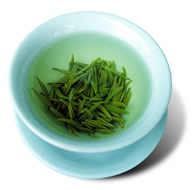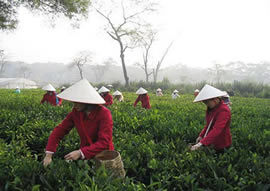Benefits of Tea:

For many and many years, there are so many studies showing that an ordinary cup of tea may be a powerful and effective infection fighter. Researchers report in the Proceedings of the National Academy of Sciences recently that they have found in tea a chemical that boosts the body’s defense fivefold against disease. They said the chemical primes immune system cells to attack bacteria, viruses and fungi and could, perhaps, be turned into a disease-fighting drug someday.
Dr. Jack F. Bukowski of Brigham and Women’s Hospital in Boston and Harvard Medical School said that he and his co-authors isolated the chemical in the laboratory and then proved with a group of volunteers that it did protect against germs.
“We worked out the molecular aspects of this tea component in the test tube and then tested it on a small number of people to see if it actually worked in human beings,” said Bukowski. The results, he said, gave clear proof that five cups of tea a day sharpened the body’s defenses against disease.

In the study, Bukowski and his co-authors isolated from ordinary black tea a substance called L-theanine. He said the substance is found as well in green and oolong tea, which also are processed from traditional tea tree leaves.
Bukowski said L-theanine is broken down in the liver to ethylamine, a molecule that primes the response of an immune blood cell called the gamma-delta T cell.
“We know from other studies that these gamma-delta T cells in the blood are the first line of defense against many types of bacteria, viral, fungal and parasitic infections,” he said. “They even have some anti-tumor activity.”

The T cells prompt the secretion of interferon, a key part of the body’s chemical defense against infection, Bukowski said.
“We know from mouse studies that if you boost this part of the immune system it can protect against infection,” he said.
To further test the finding, the researchers had 11 volunteers drink five cups a day of tea, and 10 others drink coffee. Before the test began, they drew blood samples from all 21 test subjects.
After four weeks, they took more blood from the tea drinkers and then exposed that blood to the bacteria called E-coil. Bukowski said the immune cells in the specimens secreted five times more interferon than did blood cells from the same subjects before the weeks of tea drinking. Blood tests and bacteria challenges showed there was no change in the interferon levels of the coffee drinkers, he said.
Bukowski said it may be possible to further isolate and refine L-theanine from tea and use that as a drug to boost the infection defense of the body. The health effects of tea have been extensively studied. It has been linked to lower heart disease and cancer risk through the action of flavonoids, a type of antioxidant. Other studies have linked tea to helping combat osteoporosis, the brittle bone disease, and to relieving some allergy symptoms.
Steps in the Manufacture of Tea (Camellia sinenis):
Green Tea:
Nutrition Facts and Effect of Tea :

Tea contains rich amino acid, Vitamin C, Vitamin B1 & B2,Vitamin E and B-carotene, Ca, Zn, Mn, Fe and other elements. Its catechin and oxidized contents can help to prevent formation and growth of cancerous cells, and to avert some of the worst heart diseases. Tea drinking may also help to reduce bodyweight, as well as benefits those with blood pressure and kidney problems. Besides, drinking tea is able to freshen up your breath for the day. In general, tea holds more nutrients compared to coffee. Hence drinking tea will surely be beneficial to our human health.

–Catechin and its oxidized condensed product: Anti-oxidization, prevention of cancer and anti mutagens, reduce blood cholesterol and low-density lipoproteins, controlling high blood pressure, regulate glycemia, prevent thromboembolism, build up resistance to bacteria, anti-allergic of food, regulate enterobacteria, relieve of foul and promoting weight loss. However, some studies funded by the USDA found that most bottled teas lack the major antioxidants, and some are loaded too much sugar.
–Carbohydrates: Reduce blood-sugar level and prevent high blood fat.
–Vitamin C: Anti-oxidization, prevention of scurvy and cancer.
–Vitamin E: Anti-oxidization, prevention of cancer, enhances chances of fertility.
–Zinc: Prevention of skin inflammation, improve the immune system and sensation of taste.
–Selenium: Anti-oxidization, prevention of cancer.
–Manganese: Anti-oxidization, co-enzymefactor, improve the immune system and increase metabolism.
–Flavonoid: Strengthen elasticity of capillary walls, stimulate the body, strengthen the heart, improve urination, alleviates asthma, accelerate metabolism.
–Beta-carotene: Anti-oxidization, prevention of cancer, improves the immune system.
–Caffeine: Stimulate central nervous systems, accelerate energy, strengthen heart beats, improve urination.
–Tea has zero calories and has less caffeine than coffee.
–Fluorine: Prevent tooth-decay.
How good does the Yixing purple clay (Zisha) teapot brew for tea?
The following statistics are brought up by a recent major televised media, by using 10 grams of China Green and Black tea each, brewing for 20 minutes with the same volume of fresh water 500 ml. Three fundamental factors of tea, Vitamin C, Polyphenol and Caffeine are focused on the Lab test. The adopted brewing vessels are Yixing purple clay (Zisha) teapot, ceramic cup and glass cup. The results show that Yixing clay teapot makes the best cup of tea in terms of flavor, taste, aroma and Vitamin.
Brewing Vessel
Polyphenol (mg/g)
Caffeine (mg/g)
Vitamin C (mg/g)
Yixing Teapot (Green Tea)
208.3
44.8
1.24
Ceramic Cup (Green Tea)
205.9
44.8
1.24
Glass Cup (Green Tea)
191.3
39.8
1.18
Yixing Teapot (Black Tea)
120.0
46.2
1.47
Ceramic Cup (Black Tea)
112.6
42.9
1.47
Glass Cup (Black Tea)
108.1
41.5
1.38

–Why does tea have the health benefits, which are overwhelmingly touted in the press?
Recent studies have focused on the flavonoids and carbohydrates in green tea, known for their anti-oxidant properties. Research shows that black and green teas have similar amounts of flavonoids, but they differ in the types of flavonoids present. Recently white tea has been touted as having even higher levels of flavonoids. More research is needed, but it appears that drinking any tea may provide health benefits. We offer a full variety of healthy green teas, as well as black, white, oolong/wulong teas, tea in tins and selected tea samplers.
* All the information above is taken from other sources found on the Internet and daily presses. You are always welcome to search for more details on your own if you need more information.

